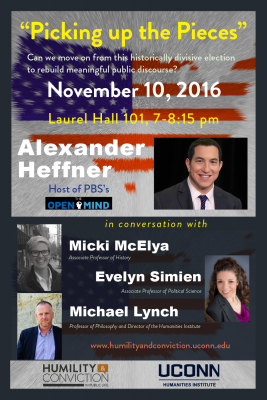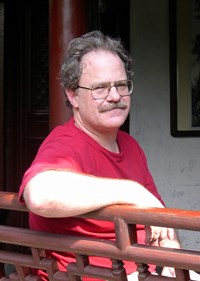 Please Join us for a Livestream today 11.10.2016 at 7:00 PM ET.
Please Join us for a Livestream today 11.10.2016 at 7:00 PM ET.
What will politics look like in the United States after the tumultuous 2016 election? On November 10, 2016, Humility and Conviction in Public Life will host Alexander Heffner, Host of PBS’s The Open Mind and a discussion on “Picking up the Pieces” of U.S. political discourse. “Humility and conviction are indeed the path forward if we are going to break through the cycle of incivility in American politics that has defined our 2016 presidential campaign, I am delighted to join the UConn community just days after we vote…to reflect on this unprecedented election, and to consider a vision for more civil American democracy.”
Heffner will be joined by UConn professor of political science Evelyn Simien and UConn professor of history, Micki McElya. Professor Simien’s most recent book, Historic Firsts: How Symbolic Empowerment Changes U.S. Politics, was published by Oxford University Press in 2015 and considers the historic firsts in American politics, including President Barack Obama and Hillary Clinton. Published earlier this year by Harvard University Press, Professor McElya’s most recent book, The Politics of Mourning: Death and Honor in Arlington National Cemetery, examines the larger political and cultural implications of the history of Arlington National Cemetery. The discussion will be hosted by Michael Lynch, a professor of philosophy, the director of the UConn Humanities Institute, and the Principal Investigator of ‘Humility and Conviction in Public Life’ project which was the recent recipient of $6 million in grant funding from the John Templeton Foundation. He is the author of the recent book, The Internet of Us: Knowing More and Understanding Less in the Age of Big Data.

